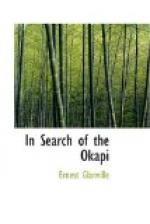Muata went off on his self-appointed task, and the white men felt, as they saw him disappear, how impossible it was for them to cope with the mystery of the forest. They were even more helpless than castaways at sea without a compass; for at sea in the day there is the clear sweep to the horizon miles away, while in the forest all they could be certain of was a little circle with a radius of less than fifty yards. Beyond that was the unknown, because unseen—a vague blur of trees that might be sheltering wild animals or savage men. And what made their helplessness the more felt, was the knowledge that Muata knew so much, and that others—the mysterious pigmies—knew still more. If there had been open glades, stretches of greensward, rippling brooks, or even a hard clean carpet such as is found under a pine forest, they would have been undismayed; but this gloomy, shrouded fastness, without glimpse of sunbeams, was becoming a nightmare.
Yet it would never do to become a prey to depression, for there is no danger so fatal to the explorer as low spirits, the forerunner of sickness.
By common consent they fought against a strong fit of the blues. Mr. Hume and Compton held a consultation over Venning, examined him, doctored him, and put him through the ordeal of a Turkish bath roughly made with the aid of the oil-sheets. After that he was rolled up in blankets and left to slumber. Compton was next treated in the same way, and then Mr. Hume busied himself with his note-book.
When the boys woke up in the afternoon, much refreshed, Muata had returned.
“Fall in, lads.”
“Has he found them?” and the boys were up and glancing round for the pigmies.
“Yes; we are to go ‘upstairs’ at once.”
“But where are they?”
“The little people have gone on,” said Muata. “They will spy out on the man-eaters.”
“You really did find them?”
“Ow aye; they know Muata. They and I have been on the path before, else they would have fallen on the young chiefs in the night—for they saw. The killing of the fierce ones much rejoiced them. It opened their lips about the upper way.”
“We are ready,” said Compton, “for the upper way—for the trapeze and the aerial flight.”
Muata struck off into the woods, and the rest crowded on him, glancing up at every tree for signs of the new track.
“Behold the road,” said the chief, showing his white teeth in a rare smile, as he caught in his hand a trailing vine that swung clear from the neighbouring growth, and reached up forty feet or so to a thick branch.
“Are we to swarm up that?”
Muata nodded.
“And what will you do with the jackal?”
The chief turned a look of disgust at his bloated ally. “He will follow underneath;” and reaching up, tie went hand over hand, using his toes very much like fingers to help. Then he lowered a rope which he had coiled round his waist; and Mr. Hume, putting the loop under his arm, trusted his weight to the swaying vine. Venning and Compton followed, with the help of the rope, but the river-man declined. He preferred to travel on the firm ground with the jackal. From the branch the four passed to the fork of the tree and held on.




